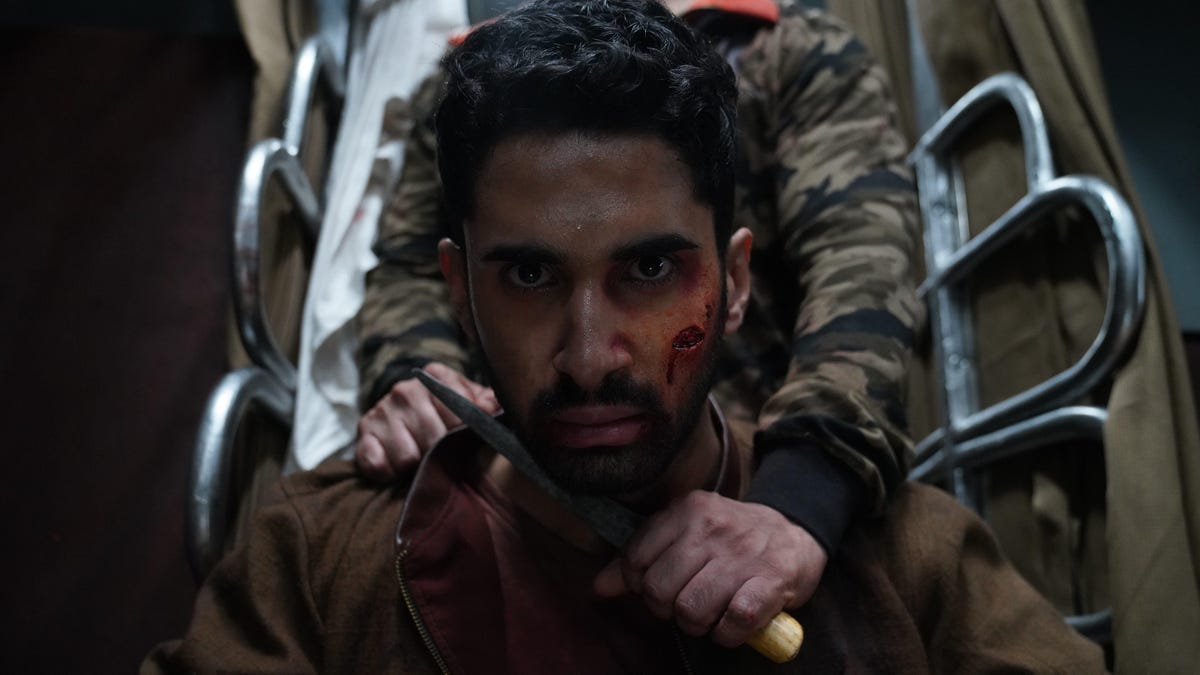Entertainment
Kill review: Gratuitous, sadistic, enjoyable action and not much else

In the cartoonishly violent Indian action flick Kill, a gang of train-robbing bandits face off against a single unstoppable passenger. Throats are cut; fingers are crushed; knives, meat cleavers, hammers, and fists swing wildly. Bodies sustain unrealistic degrees of injury and keep going in pursuit of vengeance. (Can a human being really get hit with a lead pipe that many times and still get back up?) The one-word title doesn’t actually appear on screen until almost 45 minutes in, serving both as a punctuation to the blood and bodily harm that writer-director Nikhil Nagesh Bhat has served up to this point, and as a promise (to those of us who are already guiltily enjoying this stuff) that things will only get more gratuitous and sadistic from here. A promise on which, for the most part, Kill single-mindedly delivers.
Almost the entire film is set aboard an overnight train to New Delhi. The passing countryside is a dark, green-screened blur. The bandits, headed by the sociopathic Fani (Raghav Juyal, who’s better known in India as a professional dancer and reality TV contestant), are initially hiding among the passengers. Their plan is to rob four packed sleeper cars and make their exit before the train arrives at the next station. The regular passengers include the wealthy businessman Baldeo Singh Thakur (Harsh Chhaya); his daughter, Tulika (Tanya Maniktala); and Tulika’s secret boyfriend, Amrit (the mononymous Lakshya), an elite counter-terrorist commando and the exact kind of badass you’re not supposed to cross in these situations.
Amrit comes along with his best friend and comrade-in-arms, Viresh (Abhishek Chauhan), to convince Tulika to break off an arranged engagement and elope with him. The romance is unabashedly soapy: When Amrit sneaks into a train bathroom with Tulika to propose (counter-propose?), he opens a ring box that glows like Marsellus Wallace’s briefcase while the score lays on the kind of sentimental acoustic guitar picking usually heard in flyover-state campaign ads and pharmaceutical commercials. Like the gory action that follows, it’s more than a little ludicrous and overdone; a more charitable viewer might conclude that Bhat is attempting the same level of gratuitousness in a different genre key.
While the gang’s middle-aged boss and paterfamilias, Beni (Ashish Vidyarthi), waits anxiously at the arranged meeting-place, the bandits get to work. They lock the cars off from the rest of the train, jam everyone’s phones with a gizmo, and start forcefully separating the passengers from their wallets and valuables. The whole thing turns into a bloody fracas (mostly Fani’s fault), and two passengers and one bandit end up dead. From there, the bodies pile up, giving each side increasingly gruesome motives for reprisal and revenge. The longer the showdown lasts, the more the characters seem to regress to primitive impulses. The sleeper cars begin to resemble a house of horrors.
To Kill’s credit, the bandits, however much they may fit the stereotypes of stock goons, are never treated as anonymous. They turn out to be one big extended family: uncles, nephews, brothers, and in-laws, supplied with personal reasons to keep trying to kill the seemingly unkillable Amrit. Admittedly, it’s often hard to keep track of who’s trying to avenge whom, but this only contributes to the film’s overall level of exaggerated melodrama, as does the frequently clunky dialogue. (“That commando’s love has fallen on us like a bomb!” declares Fani.) Even the facial expressions are caricatured: Glares, stares, gnashing and gritting teeth. Both hero and villain end up with plenty of blood on their faces, but their hair remains salon-styled throughout.
One likely reference point here might be the cowboy-inspired, frequently campy dacoit genre—bandit movies, basically—that became a Bollywood staple starting in the 1970s. (Kill even makes some nods to those earlier bandit flicks’ Western influences.) Another, even more obvious group of references would be the ultra-violence of Indonesian action films like The Raid, The Raid 2, and The Night Comes For Us, as well as classic American ‘80s action cheese. Sylvester Stallone’s sullen Rambo gets a name-check, but Amrit is really a hero in the mold of the glistening, stubborn Schwarzeneggerian killing machine. He even gets the requisite beefcake angles, but sadly, not the corny one-liners.
There’s something here about men becoming monsters, righteous goals, and so on, but the symbolism is inchoate; the violence, however stylized, never represents anything more than itself. Fortunately, Bhat proves to be a capable director of close-quarters action—the stabbing, kicking, punching, lunging, gouging, and chokeholds choreographed in the cramped, wobbly interior of the train. The soundtrack beats with thwacks, grunts, thuds, slashes, and crunches as bodies are pummeled in between bunks and inside vestibules, through sleeping berth curtains, against couchettes, fixtures, and slamming doors. At one point, Amrit bashes an unlucky bandit’s skull with a fire extinguisher until his head is pulverized into a gooey homogenate resembling canned tomato.
However wild and gory it gets, the mayhem never feels claustrophobic, though it almost certainly should. In fact, the biggest demerit against the film isn’t the lack of measurable depth, but its absence of spatial tension. As proficient as he may be at directing fast-moving fights, Bhat doesn’t show much of an eye for the basics of suspense: It’s hard to tell which train car we’re in or how far away one group of characters might be from another. Layout, timeframe, and distance are too vague to create a palpable feeling of danger. As a result, Kill’s forward momentum comes exclusively from the way it keeps trying to one-up itself, inventing new, grosser, more sadistic ways to maim and kill within its limited means. Aficionados of fast, violent action will have a good time, but shouldn’t expect much more.


)






